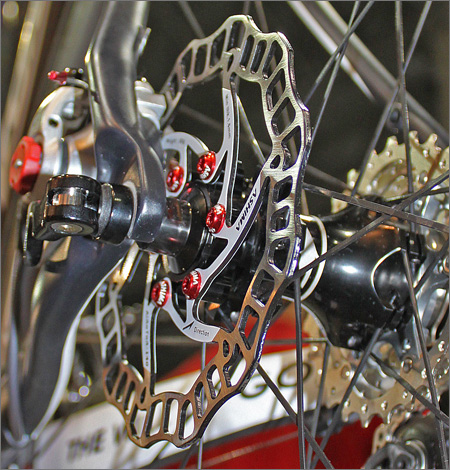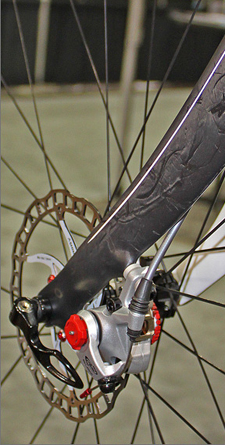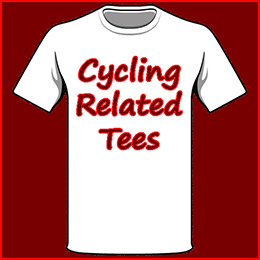Why Disc Brakes?
 Tue, October 5, 2010
Tue, October 5, 2010 
I fail to see the point of a disc brake on a road bike. A conventional caliper brake is a disc brake, with the rim being the disc.
The rim is the largest possible diameter and therefore has the most leverage when the braking force is applied.
With a disc at the hub the braking forces are transmitted through the spokes. What is more the driving stress is in one direction, followed by the braking stress in the opposite direction. Stressing spokes in this manner could possibly lead to breakage or coming loose.
With a normal caliper brake acting on the rim there is little or no stress on the spokes, (Apart from the normal weight bearing stresses.) the stress is directly from the rim to the tire.
 A disc brake means you can’t have radial spokes. Not only must there be crossed tangential spokes on the non drive side of the rear wheel, you must also have tangential spokes on the front wheel.
A disc brake means you can’t have radial spokes. Not only must there be crossed tangential spokes on the non drive side of the rear wheel, you must also have tangential spokes on the front wheel.
Tangential spokes are longer, therefore more weight; remember also this is spinning weight which is more important. A radial spoke wheel has marginally less wind resistance.
The disc and its caliper has to be heavier than the conventional brake, and more expensive to produce.
I can see an argument for a disc brake on a mountain bike or a cyclo-cross bike, because it would possibly collect less mud than a brake that operates near the tire.
But on a road bike; I just don’t get it. Why make something more complicated than it need be.
What is your view?
Update 11/17/10
An interesting piece by a commuter from Minnesota who rides through the winter in the ice and snow























Reader Comments (42)
I agree entirely, Dave. For me it's a solution looking for a problem. And it's not like existing road brakes lack power - most modulate beautifully, and the last thing you want is wheels locking up on you. Also, I can't help but think that a front disc brake will torque the steering a bit - old 9mm q/r hub MTBs with discs did. I don't want anything on my bike that affects the steering...
Rain. Snow. Ice. Those are good reasons to use disc brakes on the road.
Hi Dave, I also agree with you too. I'm so old school that I have never ridden a bike with discs. I can see their use in wet and / or muddy conditions such as MTB or 'cross. My MTB has V-brakes and with quality pads they are more than enough for me. I feel if you set up the bike so the brake levers and the calipers are properly "fitted" to the riders natural hand movement for the levers and in the case of cantilevers how the geometry of the straddle cable and the pad position is set for a given bike, you will have more than enough brakes. However, brake pads that contact the rim also heat up and under extreme high speed conditions (like a MTB downhill) you can actually pop a innertube. I know because I have done it several times. Something that comes to mind is the fact that discs allow for a lighter rim "extrusion cross section" so this will make for lighter rotating mass. But, todays high end road bikes weigh in at 16lbs. or even lighter so why bother. I like reliability most so you are not stuck somewhere. Even older road calipers can be set up to give killer brakes if done correctly. I think it just gives the bike industry something to market for the weight weenies.
I hear they actaully Work in the rain. Might rain....
Living somewhere where it rains and the grit wears your rims.
From my experience, New England winters + rim brakes = very short-lived rims.
Since disc calipers can still ice up occasionally, I really want to set up a skinny tire winter bike with front and rear drum brakes.
The only pro argument I can see on this one is adverse weather conditions or cyclocross. Even so, unless you are riding in the deep mud or sand a disc setup really isn't needed. Sure carbon rims in the rain aren't the ideal setup, but having to put rotors on all your wheelsets would not be highly cost effective. Caliper brakes are a little more forgiving when the rim is bent as compared to a bent rotor.
I have used discs and rim brakes. In regards to road bikes, I have to say that rim brakes work fine... until you are talking about a trip down a mountain pass with tubular tires. Heat weakens the bonding power of tire glue, making the likelihood of a separation more likely (however rare that may be). With clincher tires, rim brakes create heat on the rim that could cause tire failures in extreme situations.
That being said, even in clean and dry situations, disc brakes have better power than rim brakes. Hydraulic disc brakes offer better modulation with less hand fatigue than anything I have experienced. Although there is less room for error with assembly, properly assembled and maintained hydraulic disc brakes are no less reliable than cable-operated (look at your car's braking system).
Do you think there were detractors to the original derailleurs?
It goes without saying that grams on the hub are better than grams on the rim.
If you can take the engineering challenge of getting good braking out of carbon fiber rims in particular, they are going to get lighter and/or cheaper with no penalty.
of my bikes that are rideable, two have disc brakes and two have rim brakes. one set of discs is hydraulic, and the other is cable with road levers.
and if i could run discs on all my bikes, i would. purely for the all-weather performance. sure, my bikes with rim brakes work in rain. but my disc brake bikes work better.
i think weight is really a non-issue. discs aren't legal for road racing, and if they were you'd see 6.8 kg bikes with discs. my cyclocross bike is around 20 lbs, which is light enough for me.
the radial spoke issue is a fair point, but i don't ride at that performance level. and never will, to be honest.
One word - commuting. If you're doing 100k+ a week, especially in stop-start traffic you start going through pads for rim brakes every few months. Plus you're constantly adjusting the clearance. A set of disc brake pads can easily last a year or two, and quality mechanical disc brakes such as the Avid BB7 have a simple click-wheel to perform pad adjustment.
Yes, I commute on a road bike. I'm riding on the road.
On a road bike for pure road use - disk brakes are overkill. When I say pure road use, I mean the usual recreational-training-racing type of riding.
For all weather, all year commuting though - disk brakes are not a bad idea. I bike commute a lot and here in the Pacific Northwest, you can waste a fair amount of brake pads and the occasional rim from the wet, gritty conditions. On a commuter bikes, also nice to skip the cantilever or v-brake adjusting as the pads wear. My main commuter bike is a older cyclocross bike with cantilever brakes. If I was building up the ultimate commuter bike, would have disk brakes.
I've also been riding mountain bikes since '84 and can be a bit old school. Even though I've demo'd a bunch of mountain bikes with disk brakes, I never owned one until recently. There's no going back - no more mud scrape noises while braking, adjusting pads, and tons more braking power. The disk brake pads are so easy to adjust, small children could probably do it - and this is only very occasionally if they're dragging a bit.
Prior to my disk brake "conversion", my mountain bike sported Shimano XTR V-brakes and Mavic ceramic rims. In the dry, loads of stopping power and great feel. No comparison to disk brakes when wet however. If you ride in wet or gritty conditions, the Mavic ceramic rims are worth the money (still available?).
My ceramic rims now on bike number 3 (son's bike) with no rim damage from braking. That's 3 mountain bikes and 11 years of use. Amazing. Before the ceramic rims, I've wasted a fair amount of rims from mud damage.
In any case - for mountain biking, heavy commuter use, and maybe even cyclocross - disk brakes rock.
Tullio Campagnolo would roll over in his grave putting disc brakes on a road bike. When Eddy Merckx puts disc brakes on his road bike, then I will. Call me traditional and not fodder for the marketers.
Dave, you forgot that the lower fork legs must be beefier when using a disc brake.
On road bikes disc brakes make little sense but for daily commuting in areas where weather changes seasonally from sunshine to rain, sleet and snow, nothing can beat a disc brake. A cyclocross styled bike with disc brakes is the best choice.
No point in pretending that we all ride one single bike. One bike for training rides, one bike for commuting and one for serious off roading (and one for the velodrome).
I have read with interest the comments of those who use disc brakes on their commuter bikes. I would like to throw the cat among the pigeons and suggest that commuting is a particularly poor application for disc brakes...
The problem is the type of breaking typically done when commuting; high speeds are rarely built up and light breaking ls often needed in anticipation of hazards ahead (slow moving cars, traffic-lights etc.) this type of usage causes disc pads to glaze (become polished) thus giving sub rim brake power even in good weather conditions.
I can understand the desire for a hub brake on a commuter bike but I strongly suggest that a drum brake would be far superior to a disc.
I've commuted to work for a decade on rim brakes. No problem ... except for a few sketchy times in heavy rains. Going downhill, with a stoplight at the bottom, with soaked brakes and oily rims (man, who knew cars and trucks dripped so much gunk on the road!) ... it got scary.
So when I built up a dream bike for commuting and utility use earlier this year (custom frame, custom racks, Alfine internal-gear hub, generator hub up front, the whole bit) I put on Avid BB7 brakes.
Overkill, most of the time, but not in the rain in an urban environment.
My road bike? It will stay with good ol' rim brakes.
I commute on an irregular basis to my office, a journey of about 8 miles each way. When I need to be out with clients, I drive; otherwise, it's to the office for me. For such a small distance and since it is not a regular, daily grind for me, rim brakes work well. But I often thought that if I were commuting any distance of length daily, I would build a commute bike with disc brakes, simply for the reasons stated above as it relates to wet, grimy conditions.
As it relates to the force on the wheels when braking, would that not be the same issue with motorcycles, which would probably stop from a higher rate of speed, as well as stopping more weight?
Another benefit of disc brakes is that you can use different rim diameters with larger or narrower tire for different conditions. A disc brake works better than a long reach caliper for sure, and there's no issue of fender clearance or pinching.
While touring we once encountered a steep downhill coming off Aetna Summit. It was maybe 20K of gravel. We had multiple flat tires. We spent some time at a nearby creek trying to find the holes in the tubes before we realized the presta valves themselves had overheated and allowed the air to escape. Apparently the hot rims had conducted heat to the metal valves. I would have loved to have had disc brakes that day!
The "spokes weigh more" argument is a red herring. As is the argument that the calipers' slightly increased weight is a problem, as is the argument that the additional weight of the rotor is a direct loss: Dave is keen to point out that there is an increase in wheel weight, and then to suggest that this is somehow magnified because it is "spinning weight". Most of the increase in spoke weight is near the hub in this case, as is the addition of the rotor, which makes the increase in effort required to accelerate very small relative to just sticking this additional weight in a static location on the bike. On the other hand, running discs means you can ditch that stupid thick brake track (heavy throw-away material that the rim has to work properly without some day) and get rid of a substantial amount of material at the rim, where the "spinning weight" argument actually holds, so as far as acceleration (in other words, kinetic energy at a given speed), discs are even somewhat of a win. In addition, as anyone building race bikes knows (or should), it's useful to have weight down lower, and therefore moving your brake caliper from the top of your wheel to the middle makes your bike behave better in cornering. And let's not forget that we're already running _under_ the UCI limits and intentionally (re-)adding weight, so getting to move your brakes' weight lower as part of adding a bit of extra weight is a pretty good deal.
The bicycle industry needs to sell something new each
year, and consumers want something new to buy.
Sounds like a match made in heaven.
Disc brakes are fine for comfort, touring, and commuter bikes, but I would tend to laugh at someone on a full road bike with discs.
Same goes for front suspension.
A lot of heresay, urban legends, and pseudo-science. I raced tubulars. I raced clinchers. I lived, trained, and raced in the mountains of Colorado. So did so many others. I have never, ever seen anyone roll a sewup because of brake heat. When a tire was rolled (still quite uncommon) it was invariably due to a poor glue job. I can't tell you how many people can't glue a tire on very well, I lost count a long time ago. The same goes for taping handlebars. As for brake heat, the greater mass of a rim has a distinct advantage over a small disc as far as heat dissipation is concerned. It was once said that Campy brakes were never designed to stop a bike but rather to modulate the speed. In racing, that's all that matters. After all, the the goal cross the finish line first . We used to refer to Campy's main competitor some 20~25 years ago as the gruppo of the month club. Nothing has changed there either except nearly every manufacturer can lay claim to membership in the club now.
As has already been mentioned here:
Disc brakes work better in inclement conditions (rain, snow, even just cold weather). They also allow people with carbon rims to have decent braking power (not something I'd ever have to worry about - no carbon fibre on my bikes).
The only real issue would be with radial spokes, which are unnecessary for most people. I prefer to have tangential spoking on all my bikes. The roads here aren't great and the minimal performance gain is insignificant in light of my own riding deficiencies.
That being said, most of my bikes have rim brakes (since I collect vintage bikes), however the disc brakes really do seem to work better in some conditions.
I think I'm agreeing with most commenters here, especially the commuters.
For lightweight racing bikes, sure, caliper brakes rule the roost. Even in the rain (9 months of the year here in Oregon.)
But for bikes with weight on board I beg to differ.
My commuter/touring bikes have always had old-style canti brakes. I have about 1000' vertical feet every day each way on my 7-mile commute. Before I had kids the cantis were sufficient. But these days I'm towing a kiddie trailer too.
Last month I nearly rear-ended a city truck that stopped unexpectedly -- and I was following about 100' back. Spookiest 100' of my life.
Between the wear (pads every month, a rim a year), the crappy stopping power, and the NONSTOP fiddling, I am absolutely through with cantis on my utility bikes.
Next spring I'll be replacing my commuter/touring bike and I'm going disc, no doubt.
A properly-drawn free-body diagram will show that the forces acting on the spokes are independent of whether the stopping force is applied at the hub (disc brakes) or at the rim. For a given decceleration, the external forces acting on the wheel are identical; therefore, the wheel (and its components, including the spokes) are in an identical state of stress.
John
Take a radial spoke wheel; if you stop the rim from turning by applying a conventional caliper brake, the hub also stops turning. The bike and its rider are still moving forward and the stress on the spokes is a straight pull from the hub out to the rim.
If you stop the hub from turning as a disc brake will do, the rim is still trying to turn as the bike rolls forward. The spokes in a radial spoke wheel will surely twist and collapse. Or am I missing something?
Dave
I am a proponent of disk brakes - even for the serious racer (if it were allowed).
1) Less rotational mass due to no need for a brake surface.
2) I like the "ridiculous" modularity of a good disk brake.
3) Switching between my training wheels and race wheels wouldn't require a change in brake pads.
4) As a wannabe engineer I think it opens up a whole world of different wheel designs.
a) zip 303s, alum brake surface: Mass 1623 g, Fulcrum red metal 29 ers 1820g.
-- the diffeference is 200 grams PRE road specific engineering...
5) Comfort in all weather situations.
6) Tweaking a rim on a ride would still be annoying, but nearly as bad...
Yeah they look a bit silly on a RB, but overall I think its a better technology.
Dave:
There's a subtle element of apples and oranges in your analysis. The forward momentum of the bicycle wants to continue to make the wheel rotate for rim brakes, too.
There are only three forces acting on the wheel: gravity, the force applied by the brakes, and the frictional force between the tire and the ground which actually stops the bicycle. Regardless of where the brakes are applied, this force is trying to turn the wheel.
Def no discs for me, good old campagnolo brakes. I don't need anything else
One argument missed so far against discs is that 700c size wheels lose a lot of lateral stiffness when the hub flanges are moved inboard to accomodate disc rotors.
My mountain bike has disc brakes, rim brakes simply don't cut it in sketchy, steep terrain. Anything else would be a real handicap.
My road bike is fine with normal rim brakes, I only ride it in good weather.
My commuter has Magura hydraulic rim brakes, if it's classified as a road bike, then maybe discs would be good here, too. I got tired of brake cables corroded and degraded from salt and grit in winter.
Nice to see a poster mentioning Magura hydraulic rim brakes, when I put them on my mountain bike years ago the upgrade in stopping power over cantilever and the at the time newer style Vee brakes was unbelievable.
I am a pretty big in-shape guy, over 200lb. Here in Vancouver where it is quite steeply hilly and often savagely rainy I run hydraulic disk brakes on my commuter bike, 700c wheels built with XT mountain hubs, cyclo-cross rims and slicks on a tange touring/cyclo-cross frame with road gearing, a completely bombproof setup that is fast, stable and able to shrug off poor road conditions, deep potholes and the like.
The things I love most about hydraulic disk brakes are the subtle modulation and unsurpassed braking power that is available under any inclement conditions and/or long downhills, along with an almost complete lack of needed maintenance. My brake system (Hayes) is almost seven years old now and beyond an occasional line bleed and 2 minute pad change they just work.
50km/day commuting in Canada. I have a 6km steep downhill (70km/h peak) and disc brakes are a lot more reassuring in the rain.
The local bike shop does the servicing once a year and the extra cost on the new bike was less than the wheel rebuild when a bit of bent metal on the pad cut the rim off my road bike.
I'm thinking the natural progression is towards hydraulically activated disk brakes, like it has in other applications (cars, motorcycles etc.). The hydraulic actuation has advantages over cables: Feel, modulation, power, tunability of the linearity, maintenance. And the rotor has advantages over rim surfaces: single purpose design allowing cooling vents, specific materials properties for heat tolerance and dissipation etc., relatively disposable, further from the road surface. I imagine as they get more popular the weight will continue to drop, and eventually very light systems with less stopping power will be available to those who "don't want to actually stop."
So, what are the spokes busy doing when a rim-brake stops a bicycle. It seems to me that they've still got to transmit the braking force to the hub. Do you have actual data on how much stress there is or are we trying to work on urban legend and common sense? In short, a hypothesis that isn't verified ain't worth much in the real world.
Electric: while I agree with your position, I don't see why you feel the need to repeat an argument that has already been made with more explinatation and less hostility.
I suggest you read
http://davesbikeblog.blogspot.com/2008/07/is-there-connection-between-technology.html
Sorry dissonance, the hostility you claim to sense is not from me.
I just thought it's strange for people to accept the claims Dave has made at face value. If Dave explained it and measured it all somewhere else i'd honestly want to see it. Again, I just want the actual facts not urban legend or common sense explanations before condemning this technology. I'd hate for somebody to assume disc brakes are no good based on out-dated models or inaccurate data.
If it makes anyone feel better - don't call it a road bike. I love disc brakes on my 700c-equipped-bicycle-for-getting-to-work-when-it-rain-or-snows-on-the-road. They don't result in the nasty crud that drips all over and render my nice reflective sidewalls no longer reflective, they have yet to ever cause wheel failure even riding on far more serious terrain as a CAT I mountain bike dude, they require pad replacment about once every... hmm let's see... I sis have to replace the pads on one bike that I bought back in 2002.
On my "recreational" road-bike. Yeah - plain old rim brakes are plenty good & light! Just as a convertible covers all the bases on a nice sunny day.
I got it on my road bike because I thought of it as the latest innovation. Even though you have a point, I still stick to the fact that they brake well on rain or snow compared to my old one with the conventional brakes.
I agree with Paul Souders.
Riding in the city while dodging the drivers who can't in rush hour traffic while they are yammering on their cell phones, my next bike will have disk brakes.
Properly adjusted canti's work well, but I'm just tired of the constant tweaking to keep them working well.
That being said, I'd like to thank Harris Cyclery for keeping Sheldon Brown's web site up after his passing because of all the reference material.
In my opinion V brakes are the best and simplest brakes for bikes,While discs work ok i have never been overly impressed by them, they seem laggy after using V brakes there is also the load on spokes issue of wanting to pull the spokes from rim with disc brakes.
I currently am using a SA XLFDD on touring bike it is brilliant no more rim wear and the brake shoes will probably outlast me lol
Hey, Guys, I would also recommend Galassi & Ortolani here, they have been making special valves since years. The have a wide range of products, comprising: diaphragm valves, pinch valves, butterfly valves, ball valves, gate valves, check valves & pneumatic actuators. Here is their website: http://www.galassiortolani.com/category/pinch-valves/